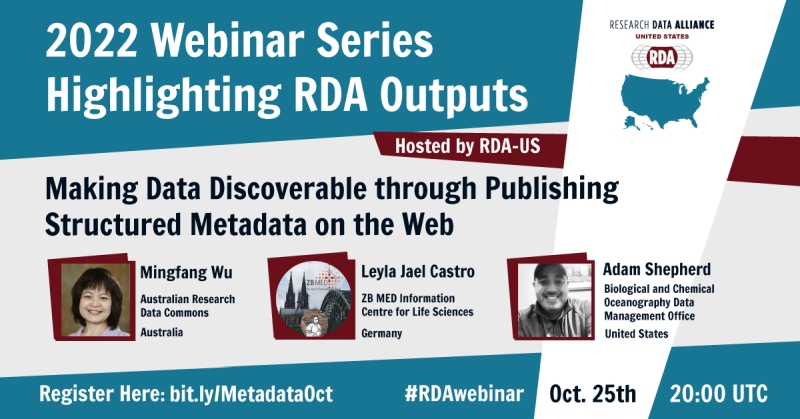Description

The FAIR principles refer frequently to metadata as a key enabler in discoverability but also have a major role in accessibility, interoperability, and reusability. Publishing structured metadata on the web can provide a simple and efficient means to increase the FAIRness of research resources: it exposes metadata contained in web pages through a formal mechanism, allowing systematic collection and processing by web-based crawlers. However, the adoption of structured metadata requires a consistent implementation across data repositories in order to enable better interoperability of metadata, and therefore improve discoverability, accessibility, and reusability of data.
In this webinar, we will present two outputs from the RDA Research Metadata Schemas Working Group: guidelines with nine recommendations and a collection of crosswalks to support the process of publishing structured metadata on the web. Data repositories that try to adopt structured metadata within and across domains would benefit greatly from the guidelines that would help ensure consistent implementation leading to enhanced discoverability and accessibility of data.
The group has produced this guideline with nine recommendations for publishing structured metadata on the web, based on community consultation and subsequent works. The nine recommendations cover the whole process of publishing structured metadata, tools that can help the process and the community engagement for sharing and contributing to common practices.
The working group has also collected and aligned crosswalks from 15 source research metadata schemas to Schema.org. The collection of the crosswalks can serve as a reference for data repositories when they develop their crosswalks, as well as an indication of semantic interoperability among the schemas.
Data repositories would benefit greatly from the recommendations that guide the process of implementing structured metadata and the collection of the crosswalks. The consistent implementation across data repositories enhances both semantic and syntactic metadata interoperability on the web, which not only makes FAIRer metadata but also enables the creation of better data aggregation and data discovery applications to realize the full potential of open data.
Who should attend
This webinar will present the guidelines for publishing structured metadata and a collection of crosswalks from metadata schemas to Schema.org. We expect the webinar will benefit
- Anyone (especially data repository/catalogue manager/developer/operator) who is interested and would like to know more about how to publish and get their data discoverable via the web architecture.
- Anyone who is interested in developing tools to facilitate crosswalks and the publication of structured metadata.
- Anyone who is interested in building knowledge graphs or any innovative data discovery applications on aggregated research data resources.
Presenters
|
Mingfang Wu Mingfang leads ARDC data discovery projects for making data discoverable by both machines and human users. |
|
Leyla Jael Castro Leyla Jael leads the Semantic Technologies team at ZB MED, a research and development team of solutions combining data analytics and semantic technologies and machine learning for knowledge discovery, information retrieval, and recommendation systems. |
|
Adam Shepherd Adam leads the technical team at BCO-DMO, a National Science Foundation funded office to work alongside BIO and CHEM oceanography NSF-funded researchers to preserve and make their data FAIR. |